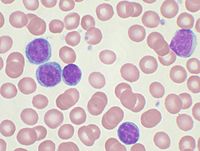
Photo from wikipedia
Chronic lymphocytic leukemia (CLL) has a variable clinical evolution, with some patients living treatment-free for decades while others require therapy shortly after diagnosis. In a consecutive series of 217 CLL… Click to show full abstract
Chronic lymphocytic leukemia (CLL) has a variable clinical evolution, with some patients living treatment-free for decades while others require therapy shortly after diagnosis. In a consecutive series of 217 CLL patients, molecular biomarkers with prognostic value (IGHV status, TP53 mutations, and cytogenetics), whose analysis is recommended prior to treatment start, were studied at diagnosis. Multivariate analyses identified prognostic variables for overall survival (OS) and time to first treatment (TTFT) and validated the CLL-IPI and IPS-E variables for all or early-stage patients (Rai 0–2/Binet A), respectively. Unmutated IGHV was associated with shorter OS and TTFT, even for early-stage patients. Lymphocyte count was not statistically significant for TTFT of early-stage patients in multivariate analysis. Our results validate the prognostic value of IGHV mutational status at diagnosis for OS and TTFT, including for early stages. Our findings suggest a role for molecular and mutational analysis at diagnosis in future prospective studies.
Journal Title: Diagnostics
Year Published: 2022
Link to full text (if available)
Share on Social Media: Sign Up to like & get
recommendations!